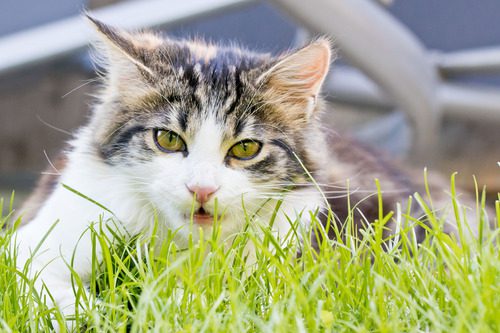Dogs often explore the world with their noses, paws, and ears. But when your dog starts scratching at their ears more than usual or shaking their head persistently, it might be a sign of ear mites. These tiny parasites can cause discomfort and lead to more serious issues if left untreated. Below, we’ll explore some of the common reasons cats may wheeze, when to seek veterinary care, and how Country Club Animal Hospital can help. If you notice any unusual behaviors or symptoms, contact Country Club Animal Hospital at (305) 663-3300 or book an appointment online for expert care tailored to your pet.

Understanding Cat Wheezing
Wheezing occurs when air has difficulty passing through the airways, creating a high-pitched, whistling sound. This can happen for various reasons, from minor irritations to serious health concerns. While it’s easy to dismiss occasional wheezing as harmless, frequent or severe episodes often indicate an underlying issue that requires attention.
What Wheezing Sounds Like in Cats
Cat wheezing can vary in intensity and duration. Some episodes may be brief, lasting only a few seconds, while others may persist for longer. Wheezing sounds can occur during inhalation, exhalation, or both. Other symptoms often accompany wheezing, such as coughing, labored breathing, or lethargy. Paying attention to these signs can help you and your veterinarian better understand what may be causing your cat’s discomfort.
What Causes a Cat to Wheeze?
Allergies and Environmental Irritants
Allergens such as pollen, dust, mold, or smoke can trigger wheezing. Environmental irritants, including household cleaners, perfumes, or even scented candles, may also affect a cat’s sensitive respiratory system. Cats with allergies may also exhibit other symptoms, such as watery eyes, sneezing, or skin irritation. If you suspect allergens or irritants are causing your cat’s wheezing, your veterinarian may recommend making adjustments to their environment to reduce exposure.
Asthma in Cats
Feline asthma can range from mild to severe. Asthma attacks are often triggered by environmental factors, including stress, airborne particles, or sudden changes in temperature. During an asthma attack, your cat may crouch low to the ground, extend their neck, and breathe rapidly. If your cat experiences frequent asthma symptoms, your veterinarian can perform diagnostic tests to confirm the condition and recommend appropriate management strategies.
Respiratory Infections
Viral infections like feline herpesvirus or bacterial infections such as bordetella often cause inflammation and congestion in the airways. Symptoms of respiratory infections often include sneezing, nasal discharge, and coughing in addition to wheezing. Prompt veterinary care can help alleviate your cat’s symptoms and prevent complications.
Hairballs or Foreign Objects
Cats groom themselves frequently, which can lead to the occasional hairball. However, in some cases, hairballs or other foreign objects may obstruct the airways, resulting in wheezing. If your cat appears to gag or retch while wheezing, it could indicate they are trying to expel a hairball. In cases where a foreign object becomes lodged in the throat, immediate veterinary assistance is essential to prevent further complications.
Heartworm Disease
Although commonly associated with dogs, cats can also develop heartworm disease. When heartworms settle in the lungs or heart, they can interfere with normal breathing and lead to wheezing. Heartworm disease in cats can be challenging to diagnose, as symptoms often mimic those of other conditions. To protect your cat, regular heartworm prevention is vital. If your cat hasn’t been on a preventative, your veterinarian may suggest testing to rule out this condition.
How Do You Know When to Contact Your Veterinarian?
While occasional wheezing may not always be a cause for concern, certain situations require professional evaluation. Contact Country Club Animal Hospital at (305) 663-3300 if you notice any of the following:
- Wheezing episodes that occur frequently or last longer than usual.
- Wheezing accompanied by coughing, lethargy, or loss of appetite.
- Visible signs of distress, such as open-mouth breathing or bluish gums.
Our veterinary team can assess your cat’s condition, identify the underlying cause, and provide a tailored treatment plan to address their symptoms effectively.
How Cat Wheezing is Diagnosed
A thorough veterinary examination is the first step in determining why your cat is wheezing. Your veterinarian may ask about your cat’s medical history, recent changes in behavior, and exposure to potential irritants. They will perform a physical examination to listen to your cat’s lungs and observe their breathing patterns. Based on their conclusion, they may need to perform additional diagnostic tests or create a treatment plan tailored to your cat’s needs.
Supporting Your Cat’s Respiratory Health
Maintaining a healthy environment can go a long way in reducing the risk of wheezing episodes. Some steps you can take include:
- Using air purifiers to reduce allergens in your home.
- Avoiding the use of strong-smelling cleaning products or air fresheners.
- Providing regular veterinary care, including vaccinations and parasite prevention.
If you suspect a specific trigger for your cat’s wheezing, making adjustments to their living environment can help improve their overall well-being.
Supporting Your Cat’s Comfort and Health
Wheezing in cats is more than just an unusual noise—it’s often a signal that something is affecting your pet’s respiratory health. From allergies and asthma to infections or obstructions, identifying the underlying cause is essential for their well-being. Paying attention to additional symptoms and acting promptly can make a significant difference in your cat’s comfort and recovery. The compassionate team at Country Club Animal Hospital can provide the expert care tailored to your pet’s needs. Call us at (305) 663-3300 or book an appointment online today to ensure your cat gets the attention they deserve.
